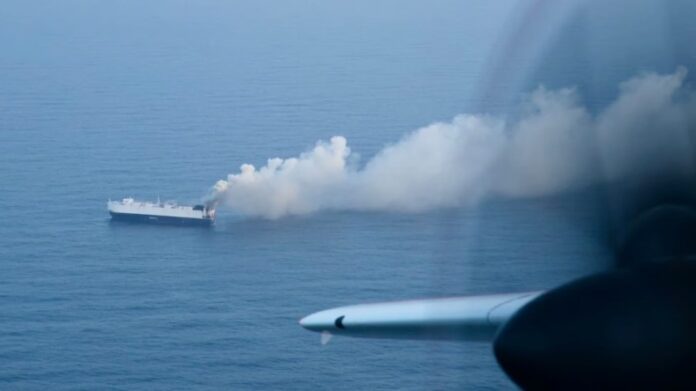Morning Midas, a cargo ship carrying nearly 3,000 cars out of which 800 are electric cars (EVs), unfortunately ran aground in the North Pacific Ocean several weeks after a fire engulfed it. The vessel, which sailed from Yantai, China, was heading to Mexico’s Lazaro Cardenas port when it suffered a tragedy.
Fire Breaks Out Mid-Voyage
Morning Midas, a 600-foot freighter, was cruising some 300 miles off the coast of Alaska on June 3 when a fire broke out on board. The source of the fire has yet to be determined. As the fire engulfed the ship, the vessel sent out a distress call.
The United States Coast Guard reacted quickly. All 22 of the crewmen aboard were evacuated safely onto lifeboats and then rescued by a merchant ship that passed by. There were no reported injuries.
Also read: Iran-Israel Ceasefire and Its Impact on Global Markets
Failed Rescue Attempts
The Coast Guard initially dispatched aircrews and a cutter boat to combat the blaze. Due to the intensity of the fire and poor conditions, however, the action was unsuccessful. A few days after, a salvage team was dispatched to assess and potentially salvage the vessel.
They tried as much as they could, but the damage had already gone too far. The fire had already damaged essential systems on board. Bad sea conditions and water leakage worsened the situation further.
Ship Sinks in Deep Pacific Waters
Eventually, the Morning Midas could not stay afloat. The ship sank on June 25 in the open seas, about 415 miles from the nearest landmass, off Alaska’s Aleutian Islands. It went down to 16,404 feet below sea level.
Zodiac Maritime, the London-based management company of the ship, confirmed the ship sinking. They attributed sinking to extensive fire damage, adverse weather, and flooding.
Environmental Response Underway
Although there were fears that the sunken cargo could cause pollution, especially from the 800 electric vehicles on board. However, no visible pollution was reported by the US Coast Guard after the incident. Public safety, Officer Cameron Snell ensured, was being awaited by response teams in standby.
Two salvage tugs carrying pollution control equipment are placed off the scene. Zodiac Maritime also committed to deploying a pollution response vehicle to assist with monitoring and cleanup if necessary.
A Glimpse at the Ship’s Voyage
The Morning Midas was built in 2006 and was registered in the Liberian flag. According to a report by marinetraffic.com, it sailed from Yantai, China on May 26 and was due to arrive in Mexico in late June.
It had 3,000 brand new cars among which hundreds were EVs. It was part of the growing sea traffic of automobile trade between North America and East Asia.
Concerns Over EV Fires at Sea
This incident revives concerns about transporting electric vehicles by sea. Batteries of EVs are found to be more prone to intense fires, and putting out such a fire in the middle of the ocean is no mean feat. While the primary cause of the fire on Morning Midas is yet to be known, analysts opine that the fact that lithium-ion batteries were aboard could have been a causative factor.
Also read: Iran-Israel Conflict Disrupts Air Travel in the Gulf
A Wake-Up Call for Maritime Safety
The Morning Midas tragedy is a sign of the need for better fire protection on car carriers, especially those shipping electric cars. The shipping industry may now be forced to rethink safety protocols, fire fighting equipment, and battery shipping practices.
Despite the fact that there was no loss of human life, environmental hazards and economic losses continue to dominate because of the loss of thousands of vehicles.
Lastly, the fate of Morning Midas serves as a bleak reminder of the dangers that lurk in global oceans.








